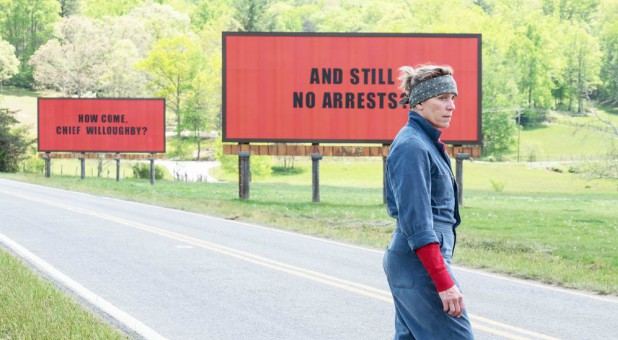‘Deeply Christian’ Film Taking the Academy Awards by Storm
I know, I know: “Best Religious Film” is not a Golden Globes category. Neither is it an Academy Awards category.
Perhaps it should be.
Three Billboards Outside Ebbing, Missouri got a lot of love Sunday (Jan. 7) at the Golden Globes—best motion picture, drama; best actress in a motion picture, drama (Frances McDormand); best supporting actor in a motion picture (Sam Rockwell); best screenplay—motion picture (Martin McDonagh).
I personally believe that it deserved every award that it got. I had seen the movie the night before; it was utterly entrancing. It was perhaps the best movie that I have seen in the past year.
Yes, great acting (seriously—has Frances McDormand ever made a bad movie?). A great screenplay.
But, the story itself is one of the most religious tales that you will see on the silver screen, and for this alone, it merits your attention.
Simply put: The movie is about sin, forgiveness and redemption.
Or, as one of my colleagues said, it was deeply Christian.
Yes—but it is also deeply Jewish.
Let me try very hard not to put any spoilers out there.
A mother (Mildred Hayes, played by Frances McDormand) whose daughter had been raped and killed. Her quest for justice. Her relationships with the local police and a town that seems eager to not help her.
But then the text opens up for us.
The police chief (Bill Willoughby, played by Woody Harrelson), is dying. He leaves letters around town for those who would survive him. They are beautiful, eloquent, personal messages. They speak to the heart of each person, letting that person know how the police chief would want them to live their lives.
In Jewish tradition, we would call such messages ethical wills.
- The tradition starts with Jacob on his deathbed, at the end of Genesis, addressing each of his sons. (It is less of an ethical will as a prediction of what would happen to the tribes in the future.)
- The tradition continues with Moses—again, addressing each of the tribes in the final moments of the Torah. (Actually, you could argue that most of the book of Deuteronomy is, in fact, Moses’ ethical will to the Jewish people.)
- The tradition continues with King David—who, on his deathbed, instructs his son and successor, Solomon, in how he would want him to live—as well as a laundry list of the people who deserve David’s posthumous vengeance.
One of the police chief’s messages lands in the hands of the racist, homophobic, violent, still-lives-with-his-mother loser cop (Jason Dixon, played by Sam Rockwell). Dixon is nothing short of a villain. There seems to be no redemptive value in him.
But, Chief Willoughby’s from-beyond-the-grave ethical will cajoles Dixon into understanding a profound truth: He will never live up to his personal and professional goals until he learns to love.
That, precisely, is what Dixon learns to do.
Right. Love. That Christian thing, you are saying.
You would be right, but you would be only half right.
Because what Willoughby is telling Dixon to do—is to develop the capacity for “hesed“—which is less about love as affection, as it is about love that comes from a deep place within you, and which translates from the Hebrew into compassion, and which then translates into a kind of covenant that exists between God’s creatures.
That is the subtext—or, perhaps, the real text—of the movie.
Yes, that’s Christian. And it is also Jewish. It lies at the heart of any number of other religious traditions that I would not have the chutzpah to pretend to know.
Three Billboards Outside Ebbing, Missouri is about unspeakable violence. It is about judgment. It is about justice. It is about forgiveness.
When it comes to the once disgusting Dixon, it is about the embodiment of two great Jewish teachings.
- “In a place where there are no men (which I would choose to translate as “menschen,” people of moral depth), strive to be a man.” (Pirkei Avot, the ethical maxims of the ancient sages)
- “Until the day of your death, God waits for you.” (High Holy Day liturgy)
The ultimate message of Three Billboards Outside Ebbing, Missouri. Given the right circumstances and the right kind of support and encouragement, deeply wounded people can engage in what Judaism would call “tikkun ha-nefesh,” the repair of their inner lives — and transcend themselves, and become deeper, holier people.
That, it seems to me, is the ultimate religious message there is.
Go see Three Billboards. It’s simply that good. {eoa}
Jeffrey Salkin is the rabbi of Temple Solel in Hollywood, Fla. The views expressed in this opinion piece do not necessarily reflect those of Religion News Service. © 2018 Religion News Service. All rights reserved.














































